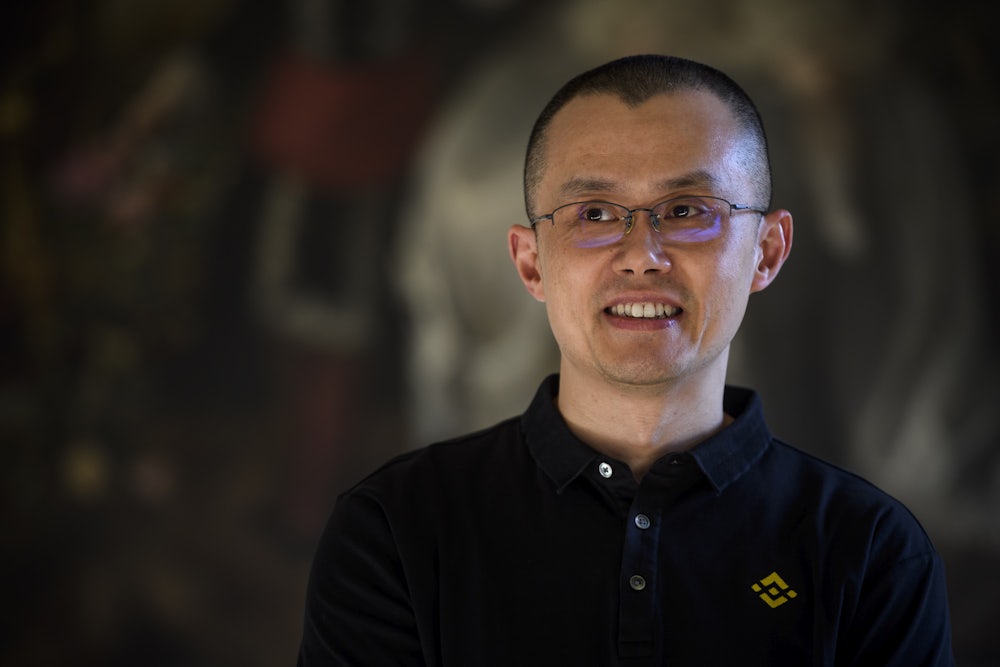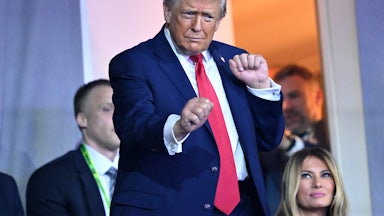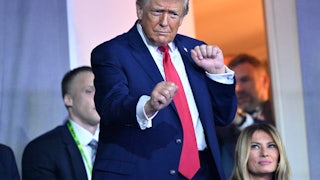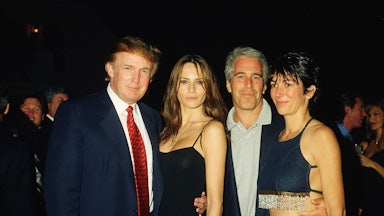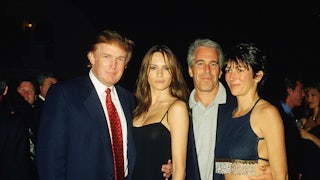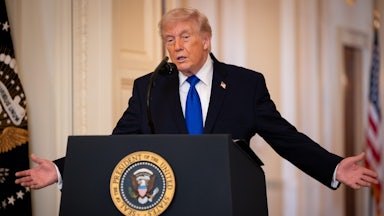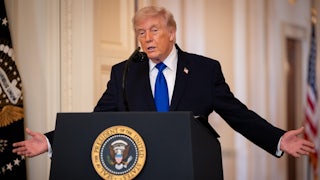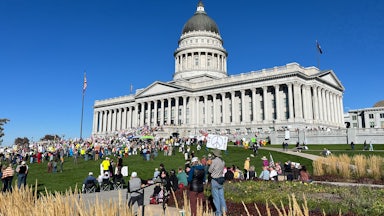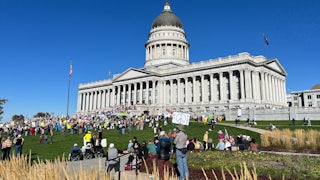I often think of Donald Trump not as a president or even as a human being but rather as a social science experiment in how much out-in-the-open corruption the American public will tolerate before it calls foul.
Does Trump collecting $2 billion from the United Arab Emirates in exchange for lifting export controls on AI chips anger you? No? How about Trump extracting $230 million in taxpayer dollars to compensate himself for past Justice Department investigations? No again? All right then, how about him pardoning a guy who’s helping him get very rich off crypto? Does that piss you off?
It certainly pisses me off. “Trump Pardons Convicted Binance Founder” reads the Wall Street Journal headline. A better headline would be: “Trump Pardons Own Goddamned Business Associate.”
Changpeng Zhao bought himself a presidential pardon by doing everything he could to boost the fortunes of World Liberty Financial, the crypto firm in which the Trump family owns a 38 percent stake, having previously owned stakes of 75 percent, 60 percent, and 40 percent. We know that the Trump family cashed out much of its initial stake, but we don’t know who bought it or whether the buyer paid a plausible market price for the shares. Given that most of Trump’s corruption hides in plain sight, anything undisclosed makes me assume the worst.
We don’t know exactly how much the Trump family has earned from World Liberty Financial, but, as I explained last week (“The Trump Family’s Ever-Expanding Portfolio of Corruption”), World Liberty is the main reason Trump’s net worth has risen from $2.6 billion in March 2024 to $7.1 billion today. Just one crypto token, WLFI, earned the Trump family $5 billion when it was launched last month. No previous financial venture of Trump’s has ever come close to generating the return on presidential politics. Did I mention Trump doesn’t appear to have invested so much as a dime in World Liberty Financial?
Changpeng Zhao is the former chief executive of Binance, which he founded in 2017. He resigned in November 2023 after accepting a plea deal from the Justice Department in which he admitted “failing to maintain an effective anti-money laundering (AML) program” in violation of the Bank Security Act.
According to the indictment, Zhao had told his employees that it is “better to ask for forgiveness than for permission.” At the time of the plea agreement, then–Treasury Secretary Janet Yellen said that “Binance turned a blind eye to its legal obligations in the pursuit of profit. Its willful failures allowed money to flow to terrorists, cybercriminals, and child abusers through its platform.” Binance paid $4.3 billion in fines, and Zhao served a four-month sentence in Lompoc, a minimum-security prison in Santa Barbara County.
Zhao agreed as part of his plea agreement never to resume an executive role at Binance. But Binance remained Zhao’s company because he owned 90 percent of it. His stake makes him, according to Forbes, the twenty-first-richest person in the world, with a net worth of $85.6 billion.
After leaving prison, Zhao set about securing a presidential pardon so Binance’s owner could once again be Binance’s chief executive. To achieve this, Zhao hired a friend of Don Jr.’s named Ches McDowell, and also Teresa Goody Guillén, who happens also to represent Zach Witkoff, chief executive of World Liberty Financial and son to chief Mideast negotiator Steve Witkoff.
Meanwhile, Zhao and Binance made themselves useful to World Liberty Financial in multiple ways. Most significantly, that $2 billion UAE payment to Trump (specifically, to World Liberty Financial, in which the Trump family then owned a majority stake) was used to purchase a stablecoin, USD1, that in turn was invested in Binance.
Binance also supplied World Liberty Financial with a trading platform, PancakeSwap, that an August Wall Street Journal story called “The Recipe Behind the Trump Family’s Crypto Riches.” PancakeSwap doesn’t disclose its ownership, the Journal said, but former Binance employees told the Journal that Binance employees created PancakeSwap in-house and that it remained under Binance supervision. World Liberty Financial used PancakeSwap to increase the use of USD1. According to Bloomberg, Binance did more than that; it “wrote the basic code to power USD1.”
Finally, Binance invited members of the Trump family to “strike a business deal … as part of a plan to return the company to the U.S.,” according to the Journal. In March, the Journal reported that “representatives of President Trump’s family have held talks to take a financial stake in the U.S. arm” of Binance. “It is unclear,” the Journal continued, “what form the Trump family stake would take if the deal comes together or whether it would be contingent on a pardon.” (Italics mine.)
The pardon removes the biggest obstacle to Binance doing business in the United States. “Deeply grateful for today’s pardon,” Zhao wrote Thursday on X. “Will do everything we can to help make America the Capital of Crypto.” Another obstacle—a Securities and Exchange Commission lawsuit accusing Binance of lying to the agency about its operations in the United States—was dropped in May. “We are operating as a fking unlicensed securities exchange in the USA bro,” the SEC lawsuit quoted Binance’s former chief compliance officer texting a colleague back in December 2018. This was nine months before Binance established its U.S. branch.
According to the March Journal story, Zhao drew inspiration from “the saga of Justin Sun, a China-born crypto entrepreneur who invested in a Trump crypto venture last fall as he faced civil charges from the Securities and Exchange Commission, according to a person familiar with the discussions.” Per the Journal: “Sun, founder of the Tron blockchain, had invested $30 million in November in World Liberty Financial, the Trump-backed crypto venture, becoming its largest investor. [In February] the SEC asked a court to pause its fraud lawsuit against Sun and three of his businesses.”
In May, Sun confirmed on X that he won Trump’s competition to purchase the most $TRUMP meme coins, which allowed him to sit at Trump’s table at the president’s dinner for the top 220 $TRUMP buyers. At the dinner, Sun was given a gold watch.
The Trump administration takes great exception to any suggestion that the cryptocurrency industry might harbor criminals. In April, the Justice Department disbanded its cryptocurrency enforcement team. White House press spokesperson Karoline Leavitt said Thursday that “President Trump exercised his constitutional authority by issuing a pardon for Mr. Zhao, who was prosecuted by the Biden administration in their war on cryptocurrency.”
Trump took the lower road. When asked about it, he said: “He was recommended by a lot of people, a lot of people say that—are you talking about the crypto person?—a lot of people say that he wasn’t guilty of anything.” When the reporter pressed Trump about his family’s connections to Binance, Trump answered: “Well, you don’t know much about crypto. You know nothing about nothing, you fake news.” He sounded exactly like a cheap hood.
Zhao isn’t even the first cryptocriminal to receive a Trump pardon. In January, Trump gave one to Ross William Ulbricht, a.k.a. Dread Pirate Roberts, who ran an online drug bazaar and hired hit men to kill competitors (though the killings never took place). The IRS official who nabbed Ulbricht is one of the public service heroes profiled in Michael Lewis’s recent anthology, Who Is Government? In March, Trump pardoned three founders of the BitMEX crypto exchange who, like Zhao, pleaded guilty to violating the Bank Security Act, in this instance paying $30 million in fines.
But nobody worked harder for his pardon than Zhao. We have every reason to believe he’ll continue to show the Trump family how very, very grateful he is.
